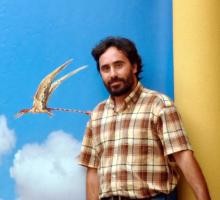The sauropod dinosaur Turiasaurus riodevensis in the Late Jurassic of Portugal
- Citation:
- Mateus, O. (2009). The sauropod dinosaur Turiasaurus riodevensis in the Late Jurassic of Portugal. Journal of Vertebrate Paleontology. 29, 144A., Jan
Abstract:
A partial sauropod was found in 1996 in Vale Pombas, north of Lourinhã, Central West of Portugal, in the Lourinhã Formation, top of Amoreira Porto Novo member dated as c. 150 M.a. (Early Tithonian, Late Jurassic) and is currently housed at Museum of Lourinhã, in Portugal. The specimen (ML368) comprises a complete tooth with root, anterior chevron and almost complete right forelimb including partial scapula, complete coracoid, humerus, ulna, radius, metacarpals I, III and V, phalanx, and ungual phalanx I. It can be ascribed to Turiasaurus riodevensis, which was previously described from the Villar del Arzobispo
Formation at Riodeva (Teruel, Spain). Characters shared with T. riodevensis holotype include: curvature and asymmetry of tooth crown, expansion of crown, outline of humerus, medial deflection of the proximal end of humerus, shape and prominence of deltopectoral crest, vertical ridge in the distal half of the ulna (considered as diagnostic of Turiasauria), configuration of metacarpals, and bone proportions. It differs from T. riodevensis holotype by the smaller size and the more rectangular ungual phalanx in lateral view. The sediments from which the Riodeva specimen was recovered were previsouly thought to be Tithonian to Berriasian in age. The presence of this species in Portugal, in beds confidently dated as Early
Tithonian, may allow a more precise date for the Riodeva type locality of early Tithonian in age. The humerus of the Portuguese T. riodevensis is 152 cm long. Although shorter than the Spanish specimen (790 mm), it represents a large individual. All adult sauropods recovered in Portugal thus far are very large individuals: Dinheirosaurus (estimated body length is 20-25 m), Lusotitan (humerus length estimated to be 205 cm), Lourinhasaurus (femur length: 174 cm), and Turiasaurus here reported. The lack of of small or medium adult body-size sauropods in the Late Jurassic of Portugal, suggests browsing niches thought to be occupied by smaller forms, could be have been available for other dinosaurs, like the long necked stegosaur Miragaia longicollum.
Notes:
n/a
